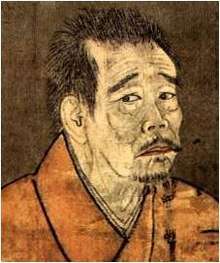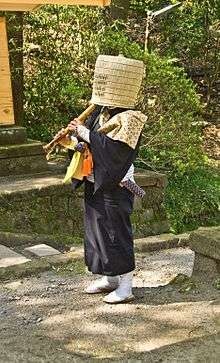Ikkyū
Ikkyū (一休宗純, Ikkyū Sōjun, 1394–1481) was an eccentric, iconoclastic Japanese Zen Buddhist monk and poet. He had a great impact on the infusion of Japanese art and literature with Zen attitudes and ideals.[1]
Ikkyū | |
|---|---|
 | |
| Title | Zen Master |
| Personal | |
| Born | 1394 Kyoto, Japan |
| Died | 1481 |
| Religion | Buddhism |
| School | Rinzai |
| Senior posting | |
| Predecessor | Kaso |
| Part of a series on |
| Fuke Zen |
|---|
 |
| People |
|
| Philosophy |
| Places |
|
| Topics |
| Literature |
|
Biography
Childhood
Ikkyū was born in 1394 in a small suburb of Kyoto. It is generally held that he was the son of Emperor Go-Komatsu and a low-ranking court noblewoman.[1] His mother was forced to flee to Saga (嵯峨), where Ikkyū was raised by servants. At the age of five, Ikkyū was separated from his mother and placed in a Rinzai Zen temple in Kyoto called Ankoku-ji, as an acolyte.[1] The temple masters taught Chinese culture and language as part of the curriculum, a method termed Gozan Zen. He was given the name Shuken, and learned about Chinese poetry, art and literature.
Training
When Ikkyū turned thirteen he entered Kennin-ji in Kyoto to study Zen under a well known priest by the name of Botetsu. Here Ikkyū began to write poetry frequently that was non-traditional in form. He was openly critical of Kennin-ji's leadership in his poetry, disheartened with the social stratum and lack of zazen practice he saw around him. In 1410, at the age of sixteen, Ikkyū left Kennin-ji and entered the temple Mibu-dera, where an abbot named Seiso was in residence. He did not stay long, and soon found himself at Saikin-ji in the Lake Biwa region where he was the sole student of an abbot named Ken'o. It seemed Ikkyū had finally found a master that taught true Rinzai Zen as Ikkyū saw it. Ken'o was sporadic in his teaching style and was a strong believer in the supremacy of zazen. In 1414, when Ikkyū was 21, Ken'o died. Ikkyū performed funeral rites and fasted for seven days. In despair Ikkyū tried to kill himself by drowning himself in Lake Biwa, but was talked out of it from the shore by a servant of his mother.
Ikkyū soon found a new teacher in a master named Kaso at Zenko-an, a branch temple of Daitoku-ji. Kaso was much like Ken'o in his style. For years he worked hard on assigned kōans and made dolls for a local merchant in Kyoto. In 1418 Ikkyū was given Case 15 of the Mumonkan, ("The Gateless Gate", a famous set of 49 kōans), known as "Tozan's Three (or 60?) Blows", which depicts Tozan becoming enlightened when Ummon rebukes him for wandering from one monastery to another. One day a band of blind singers performed at the temple and Ikkyū penetrated his koan while engrossed in the music. In recognition of his understanding Kaso gave Shuken the Dharma name Ikkyū, which roughly means One Pause. In 1420 Ikkyū was meditating in a boat on Lake Biwa when the sound of a crow sparked satori. Kaso confirmed this great enlightenment and granted Ikkyū inka. Ikkyū came up against the jealousy of Yoso, a more senior student who eventually came to run the monastery. In Ikkyū's poems, Yoso appears as a character unhealthily obsessed with material goods, who sold Zen to increase the prosperity of the temple.
Vagabond
Ikkyū could sometimes be a troublemaker. Known to drink in excess, he would often upset Kaso with his remarks and actions to guests. In response, Kaso gave inka to Yoso and made him Dharma heir. Ikkyū quickly left the temple and lived many years as a vagabond. He was not alone, however, as he had a regular circle of notable artists and poets from that era. Around this time, he established a relationship with a blind singer, Mori, who became the love of his later life.
Ikkyū worked to live Zen outside of formal religious institutions. However, the Ōnin War had reduced Daitokuji to ashes, and Ikkyū was elected abbot late in life, a role he reluctantly took on. This firmly placed him in one of the most important Zen lineages. In 1481, Ikkyū died at the age of eighty-seven from acute ague.
Impact
Ikkyū is one of the most significant (and eccentric) figures in Zen history. To Japanese children, he is a folk hero, mischievous and always outsmarting his teachers and the shōgun. In addition to passed down oral stories, this is due to the very popular animated TV series Ikkyū-san. In Rinzai Zen tradition, he is both heretic and saint. Ikkyū was among the few Zen priests who argued that his enlightenment was deepened by consorting with pavilion girls. He entered brothels wearing his black robes, since for him sexual intercourse was a religious rite. At the same time he warned Zen against its own bureaucratic politicising. Usually he is referred to as one of the main influences on the Fuke sect of Rinzai zen, as he is one of the most famous flute player mendicants of the medieval times of Japan. The piece "Murasaki Reibo" is attributed to him. He is credited as one of the great influences on the Japanese tea ceremony, and renowned as one of medieval Japan's greatest calligraphers and sumi-e artists.
Ikkyū wrote in Kanbun style classical Chinese, which was employed by many contemporary Japanese authors. For instance, the "Calling My Hand Mori's Hand" poem.
我手何似森手 |
My hand, how it resembles Mori's hand. |
In popular culture
In the anime OVA Read or Die, a clone of Ikkyū appears as the leader of the villains, all of whom are also clones of famous historical figures.
In the second edition of the book On the Warrior's Path, author Daniele Bolelli refers to Ikkyū as his "hero and philosophical role model". He also explored Ikkyū's life story in a chapter of his 50 Things You're Not Supposed to Know: Religion, and in two episodes of the podcast History on Fire.[3]
The Japanese manga author Hisashi Sakaguchi wrote a life story of Ikkyū, あっかんべェ一休, 'Ikkyu', or 'Akkanbe Ikkyu', more or less according to the popular stories about him. The manga has been translated in four volumes into Catalan, Spanish, French, German and Italian. In the manga Afterschool Charisma, a clone of Ikkyū appears among the main body of classmates in a special school filled with clones of famous historical figures. Comic author Tom Robbins identifies Ikkyū as his "idol".[4][5] In the anime/manga Eyeshield 21, Hosakawa Ikkyū (細川一休) is the name of the genius cornerback on the Shinryuji Naga American football team.
In the PSP game GA Geijutsuka Art Design Class Slapstick Wonderland, the children's story version of Ikkyū can be chosen as the picture book project theme/final story part of the game.
Kleenex Girl Wonder wrote the song Don't Cry, Ikkyu about Ikkyū.[6]
In the Kamen Rider Ghost DVD special, Ikkyu Eyecon Contention! Quick Wit Battle!!, the soul of Ikkyū helps Takeru Tenkuji/Kamen Rider Ghost to access his monk-like Ikkyū Damashii form.
Wednesday Campanella's song and PV Ikkyu-san.
Notes
- Kodansha Encyclopedia of Japan, entry "Ikkyū" by James H. Sanford
- Tr. Arntzen 1987:158, note Ikkyū's use of the literary metaphor gyōkeihō 玉茎萌 "jeweled stem" meaning "phallus".
- http://historyonfirepodcast.com/episodes/2019/3/18/episode-45-sex-sake-and-zen-the-life-of-ikkyu-sojun-part-1. Missing or empty
|title=(help) - Robbins, Tom (2006). Wild Ducks Flying Backward. Random House. ISBN 0-553-38353-1.
- Opening Remarks at Northwest Bookfest 1996. Random House. 2006. ISBN 9780553902945. Retrieved 2011-05-01.
- "Don't Cry, Ikkyu".
References
- On the Warrior's Path, Daniele Bolelli, Blue Snake Books, 2008.
- Random House Digital, Inc., 2006
- The Possible Impossibles of Ikkyu the Wise, I.G. Reynolds, 1971, Macrae Smith Company, Philadelphia, Trade SBN: 8255-3012-1.
- Ikkyu and the Crazy Cloud Anthology, Sonja Arntzen, 1987, University of Tokyo Press, ISBN 0-86008-340-3.
- Unraveling Zen's Red Thread: Ikkyu's Controversial Way, Dr. Jon Carter Covell and Abbot Sobin Yamada, 1980, HollyM International, Elizabeth, New Jersey, ISBN 0-930878-19-1.
- Wild Ways: Zen Poems of Ikkyu, translated by John Stevens, published by Shambhala, Boston, 1995.
- Crow with No Mouth, versions by Stephen Berg, published by Copper Canyon Press, WA, 2000. ISBN 1-55659-152-7.
- Steiner, Evgeny. Zen-Life: Ikkyu and Beyond. Cambridge Scholars Publishing, 2014. ISBN 978-1-4438-5400-9.